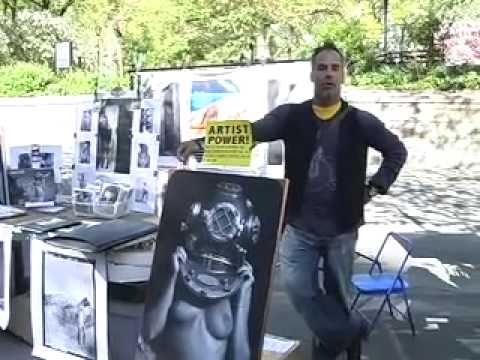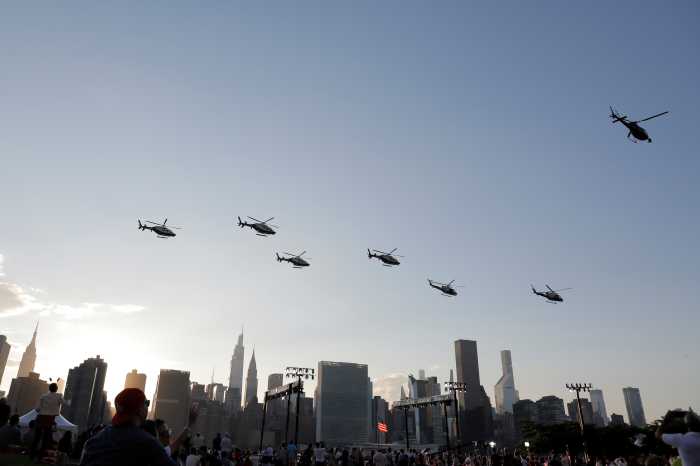BY ALBERT AMATEAU | Robert Lederman, founder and president of A.R.T.I.S.T. (Artists’ Response to Illegal State Tactics), is running out of options in his fight to overturn the Parks Department’s 2010 rules limiting where, in a few Manhattan park locations, street artists may vend their work.
The city says the rules, adopted nearly four years ago, are intended to balance the rights of vendors of First Amendment-protected artwork with the city’s duty to ensure the public’s right to safely enjoy crowded locations in Central Park, Union Square Park and Battery Park and on the High Line.
Lederman, who has won previous lawsuits against the city for arresting him and other artist vendors for selling their wares in streets and parks, said the rules went far beyond public safety and park enjoyment. The rules illegally limit the number of artists who can sell their works in locations where potential patrons may see them, Lederman contended.
In July 2010, Lederman and his fellow artists went to Manhattan District Federal Court to overturn the new rules. But Judge Richard Sullivan agreed with the city and dismissed the case at the end of September 2012.
Lederman’s attorney, Julie Milner, said at the time that she was surprised at the dismissal and filed an appeal with the U.S. Second Circuit Court. But in September 2013 the five-judge panel upheld Judge Sullivan’s decision.
In December, Milner applied to the U.S. Supreme Court for a review, but this March 3 the high court refused to accept the case.
Lederman, a New Jersey resident who has been arrested more than 40 times from 1994 to 2001 while vending his work in various Manhattan locations, is soldiering on.
Two weeks ago, he sent a 12,000-word letter to Mayor de Blasio urging him to revoke the 2010 rules. A copy of the letter also went to the new City Council speaker, Melissa Mark-Viverito.
In 2010, Mark-Viverito, as a councilmember from East Harlem, testified against the park rules at public hearing before the measure was adopted, Lederman noted in the letter.
Lederman is also collecting signatures via e-mail on a petition: “Please revoke the 2010 park rules that restrict the First Amendment rights of visual artists and performers.”
Lederman’s federal court suit made the point that the 2010 rules did not specify musicians and other performers, and contended that the omission constituted unequal enforcement targeting visual artists. The Parks Department soon revised the vending rules for the four parks locations to include performers.
Lederman told The Villager on Tuesday that the petition had 225 signatures of street artists.
“I’ve not submitted the petition yet — hoping for a meeting with the mayor first,” Lederman said.
Lederman said he could not accept losing the court case because he believed former Mayor Bloomberg, former Parks Commissioner Adrian Benepe and city lawyers who worked on the case, “repeatedly committed perjury in sworn and affidavits and in oral testimony from day one to the very end of the lawsuit.”
In upholding the dismissal, the Circuit Court accepted that art sold in public had First Amendment protection but said the city had the right to “impose reasonable content-neutral restrictions on the time, place or manner of protected speech.”
Lederman also charged that both the Bloomberg administration and the previous administration of Mayor Giuliani, as well as their Parks commissioners, were biased against street artists.
But the Circuit Court denied Lederman’s application to depose Mayor Bloomberg and other city officials on the facts of the case.
In his letter to Mayor de Blasio, Lederman recalled that the city justified the new rules by contending that artist vending was “commercializing the parks, causing congestion, obstructing the view of public monuments and denying the public full enjoyment of the parks.”
Lederman went on to say that as soon as the artists were removed, the locations were then “bid out to corporations for the purpose of promoting their products and services.”
He is especially incensed by the annual holiday-season vending market concessions at Union Square Park and Central Park at Columbus Circle, two locations where the 2010 rules restrict the number of street artist vendors.
During the Giuliani administration, between 1994, when Lederman organized A.R.T.I.S.T., and 2001, the conflict between the city and the street artists escalated. Lederman’s art often featured portraits of Giuliani depicted as Hitler, Nero and other dictators of world history.
Lederman also filed a series of lawsuits against the city regarding street artists. He won several, including one federal suit culminating in a 2001 U.S. Supreme Court decision upholding artists’ right to vend in front of the Metropolitan Museum of Art without a Parks Department permit.
The ruling and a settlement also applied to all New York City parks, and the principles were included in the general vending rules. However, in 2009, Lederman was again arrested for vending without a permit on the newly opened High Line. He sued again and won again. But that victory prompted the city to propose the new rules adopted in 2010 governing vending in locations in Union Square, Battery Park and Central Park, plus on the High Line.
By press time on Wednesday, neither the mayor nor the Council speaker had replied to inquiries regarding Lederman’s letter.
The fallout from the dismissal of the case has impacted artist vendors in other cities, according to an online Newsweek article. Street artists fear the loss has already encouraged Venice Beach, near Los Angeles, to require permits for vending expressive material, the Newsweek article said, adding that in San Francisco and St. Augustine, Florida, street artists are also facing permit requirements.



























